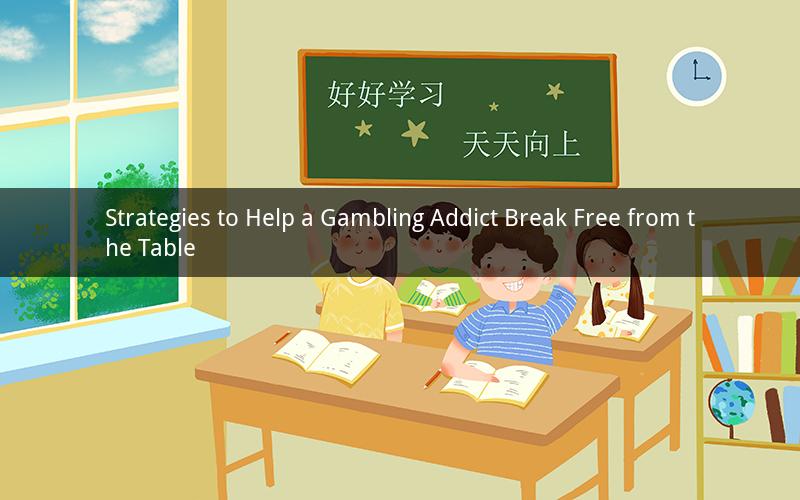
Gambling addiction is a serious issue that can have detrimental effects on an individual's life. It can lead to financial ruin, strained relationships, and even mental health problems. If you know someone who is struggling with a gambling addiction and is constantly drawn to the table, it's important to take action. Here are some effective strategies to help a gambling addict break free from the table.
1. Understand the addiction
Before attempting to help someone overcome their gambling addiction, it's crucial to understand the nature of the addiction. Gambling addiction is a psychological disorder characterized by an inability to control gambling behavior, despite negative consequences. This addiction often stems from a desire for excitement, thrill, and the potential to win big.
2. Encourage professional help
The first step in helping a gambling addict is to encourage them to seek professional help. A therapist or counselor can provide personalized support and develop a tailored treatment plan. Therapy may include cognitive-behavioral therapy (CBT), which focuses on identifying and changing harmful thoughts and behaviors.
3. Support the individual's efforts
Supporting the individual's efforts to quit gambling is essential. This can be achieved by:
- Being empathetic and non-judgmental
- Encouraging them to share their feelings and experiences
- Celebrating their progress, no matter how small
- Offering to accompany them to therapy sessions or support groups
4. Create a safe environment
Creating a safe and supportive environment is crucial for a gambling addict. Here are some ways to achieve this:
- Remove access to gambling venues and devices
- Encourage alternative activities that promote well-being
- Avoid enabling behaviors, such as lending money or covering their losses
- Offer assistance in managing financial difficulties
5. Encourage participation in support groups
Support groups can provide a sense of community and understanding for individuals struggling with gambling addiction. Encourage the individual to join a local or online support group, such as Gamblers Anonymous. These groups offer a platform for sharing experiences, learning coping strategies, and receiving support from others who have faced similar challenges.
6. Monitor progress and offer ongoing support
Recovery from a gambling addiction is a long-term process. It's important to monitor the individual's progress and offer ongoing support. This may involve:
- Regular check-ins to discuss feelings and challenges
- Encouraging them to continue therapy and attend support group meetings
- Being available to listen and provide reassurance
- Recognizing and celebrating milestones
7. Educate yourself and others
Educating yourself and others about gambling addiction can help break the stigma surrounding the disorder. Share information about the signs and symptoms of gambling addiction, as well as available resources and support options. This can promote understanding and empathy towards those struggling with the addiction.
8. Set boundaries and communicate effectively
Setting clear boundaries and communicating effectively with the gambling addict is essential. This may involve:
- Establishing rules and consequences for gambling behavior
- Communicating your concerns and feelings in a non-confrontational manner
- Being prepared to enforce boundaries, even if it means limiting contact
- Encouraging open and honest communication
9. Seek help for co-occurring disorders
Many individuals with gambling addiction also struggle with other mental health issues, such as depression, anxiety, or substance abuse. Encourage the individual to seek help for these co-occurring disorders, as they can exacerbate the addiction and hinder recovery.
10. Be patient and persistent
Recovery from a gambling addiction is a challenging process that requires patience and persistence. Understand that setbacks are possible, and it's important to remain supportive and encouraging throughout the journey.
FAQs:
1. How can I help a family member who is struggling with a gambling addiction?
Encourage them to seek professional help, offer support, and create a safe environment. Educate yourself and others about the addiction, and be patient and persistent in your efforts to help them recover.
2. What are some signs of a gambling addiction?
Signs of a gambling addiction include preoccupation with gambling, hiding gambling activities, lying about gambling habits, neglecting responsibilities, and experiencing financial, emotional, and social problems due to gambling.
3. Can therapy help someone overcome a gambling addiction?
Yes, therapy, particularly cognitive-behavioral therapy (CBT), can be highly effective in helping individuals overcome a gambling addiction. Therapy can help identify and change harmful thoughts and behaviors, providing tools for long-term recovery.
4. How can I support someone attending a support group for gambling addiction?
Be empathetic and non-judgmental, offer to accompany them to meetings, and celebrate their progress. Encourage them to share their experiences and seek support from others in the group.
5. What can I do if my loved one refuses to seek help for their gambling addiction?
Continue to offer support and express your concerns, but be prepared to set boundaries and enforce them if necessary. Seek guidance from a professional or support group to help you navigate this challenging situation.